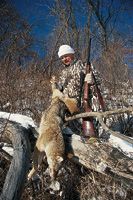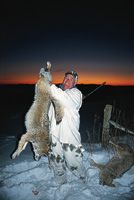---------------------------------------------------------------------------------------------
wolf howlingfreewebs.com
There are many misconceptions regarding the reasons wolves howl. Contrary to popular belief, wolves do not howl for the sake of howling at the moon, and despite the traditional imagery, wolves do not always sit when they howl - they often remain standing. Also, wolves do not howl only at night. They will howl during the daytime, evening or early morning.
They often howl together in a group, and one wolf in the pack will usually start the howling session by pointing its nose towards the sky and howling. The other members of the pack will soon join in excitedly. Under ideal conditions, wolf howls can be heard from as far away as 10 miles (16 km).
While howling, wolves often alter their voices considerably. As a result people are often "fooled" into believing that there are more wolves present than there really are when they hear wolves howling. People have often guessed, based on listening its howls, that a pack of wolves contained up to 20 individuals, when there were only 3 or 4. Some people have claimed that wolves do that deliberately, in order to fool neighbouring packs into believing that there are more animals present than there really are. However, many naturalists and wolf biologists do not accept that idea.
Wolves seem to howl for many reasons. They often howl before they go on a hunt, possibly to rally the pack together, and they often begin to howl after a successful hunt. That suggests that howling serves to assemble a pack together, as wolves often become separated from each other during a hunt. They do not, however, howl while they are hunting, as that would alert potential prey items to the wolves' presence, giving them more time to escape.
In addition, a wolf may howl alone if it is having troubles locating its pack, as pack members seem to recognize each other's voices, since individual wolves often have their own characteristic way of howling. Wolves will also howl in apparent grief after the death of their mates, and lonely wolf pups often howl in distress. And, as R. D. Lawrence has written in his book, Trail of the Wolf, "somewhat like humans, they [wolves] enjoy a singsong."
Wolf packs may also howl to communicate with other packs, as two different wolf packs will sometimes answer each other's howls. Wolves will also often answer the calls of humans mimicking wolf howls. L. D. Mech (1970) notes that wolves often remain silent for 20-30 minutes after a howling session. He suggests that such a silent period would allow each pack to listen for other wolf packs. If different packs repeated their howling right away, it would be difficult for any one pack to determine how many other packs were in the area.
Wolves howl less frequently during May and June than they do during the rest of the year, likely because that is the time that packs are most likely to have young pups present. It is possible that wolf packs who have young pups present often keep silent so they do not attract attention to their whereabouts, since pups are vulnerable to predators like bears and cougars.
---------------------------------------------------------------------------------------------------------------------
| ||||||














8 comments:
uuu
I am appreciative of the information regarding howling of coyotes. I think there is a lot more to be learned about the howling of coyotes , wolves and coy wolves (eastern coyotes).
I am still curious why I have never heard a "coyote" howl during daytime or even evening hours. I have lived in rural central New York for over 35 years. Coyotes are plentiful here.
am a birder with some expertise in identifying birds. Much if no It most of my birding identification is done by listening to bird calls e.g. ravens, warblers, eagles catch my attention wherever I am. I am acutely aware and attuned to any sounds wherever I am. There is simply no way i would miss the howl of a coyote and I spend a great deal of time outside near my rural home.
Obviously other people have heard howling during the day or twilight so I can't question that. So, then my question becomes, do coyotes howl differently in different areas of the US?
Outside of New York I spend only limited time of not more than two weeks at a time in Florida (Everglades), Arizona desert, Montana, Idaho, Wyoming, Texas, Ohio, Cape Cod etc to name a few, so I cannot really speak to these areas.
Another question that ties in with the geographic question is the genetic question. Do eastern coyotes (or coy wolves) as we have in New York state behave differently than western coyotes?
While right at this moment I cannot lay my hands on the source, I recall one essay or study on coyotes versus wolves versus coy wolves that spoke to the behavioral differences of the coy wolf and the western coyotes, focusing on the coy wolf acting increasingly like a wolf. Some examples seem to be pack behavior and there was also a mention of howling differences that stated that coy wolves increasingly howl more like wolves, possibly and evolutionary change here in the east.
So as well as the the information of whether or not coyotes howl during the it would be useful to know where in the U.S., and which animals we are talking about, coyotes in the west? eastern coyotes( wolf coyote hybrids) ? etc
I will try to find out if anyone here in my area has heard coyotes in daylight. It can't be that common here if it occurs at all.
Dave,
I'm downstate in the Gunks east of the Catskills. I've had the privilege to live near several dens and have heard coyotes howl during daylight/twilight any number of times.
Regarding pack behavior, some have suggested that eastern coyotes might pack up more if they weren't hunted to relentlessly (24-7, six-month open season, no bag limit: yeah, we're enlightened here in the NY). According to Roland Kayes, 8 out of 10 coyotes in NY don't make past their first year. Packs are simply extended families who might collaborate more and perhaps take more adult deer during more of the year if they were permitted stay together longer. That being said, there's so much deer to scavenge, they don't need to hunt them. Over 60% of their diets in NY are scavenged deer.
Chris
Thanks Chris. Obviously from all the reports, coyotes howl during the day. My question now is why they don't do that around my house ( and I have lots of coyotes).
On another more important note regarding your mention of coyotes hunting, soon we may have year round hunting here in NY if some legislators have their way.
Now, coyote hunters are allowed to use electronic calls, bait piles, scopes and night vision devices, dogs, and traps. So where does "fair chase" factor in? Perhaps by "fair chase they mean the snowmobiles that many hunters use to chase coyotes.
Why can't New York follow the lead of California where the public has pushed successfully to ban cougar hunting completely, and banned the use of dogs for bear hunting and bobcats? It just seems that the public in New York has no clout at all to make any changes in our hunting laws. The vocal pro hunting minority seems to get just about everything they want.
Anyone from Chicago out there?
Chicago has a good sized coyote population, estimated at over 200.
Has anyone ever heard a coyote howl in Chicago?
At night? During the day? Evening?
The following is an excerpt from the Cook County, Illinois, Coyote Project
"But, do coyotes in urban areas howl? In Cook County we have observed that some groups howl frequently, whereas other groups rarely howl. For example, we observed a coyote group that had a territory which included a fire station, and those coyotes regularly howled in response to the sirens of emergency vehicles. Other groups were rarely, if ever, heard howling."
There is some evidence that coyotes alter their behavior in proximity to humans.
200 should be 2000.
Dave...............try emailing Stan Gehrt who heads up the Cook County Coyote study
gehrt1@osu.edu..................Perhaps he can shed light on daytime howling in and around Chicago
I have been flummoxed for years as to the how-and-why of coyote howling variation in different areas, and am still flummoxed! I have lived in Texas and spent some extended time two different times in Montana, and the coyotes there could be heard almost every night. I began to believe the theory(and perhaps there is something to it--I just don't know exactly what!) that in the East, perhaps because of severe persecution, they adapted to being quieter--but then to contradict this(as coyotes are so wont to do!), where my maternal relatives live in Northern Georgia, and where coyotes are as severely persecuted as anywhere else, the coyotes howl regularly and long, most any night! The theory that they don't howl much until their numbers get built up(as a means to define territories) seemed to perhaps have some validation, except where I live now in North Carolina, coyotes are EVERYWHERE, and I rarely hear them(but I do, sometimes)--and when I do hear them, they are often very perfunctionary and short howls--a quick single note or two, and that's it. At a distance, it sounds amazingly like a distant rooster crow does, to be even more confusing! And then, I have heard local regular, lengthy song-fests, but they are rare occaisions. And I am out and roaming the woods at night regularly, so I should be hearing them if they are singing much, at least in the distance. And I just don't! So who the heck knows? Anyway, it is all fascinating stuff!.....L.B.
Post a Comment